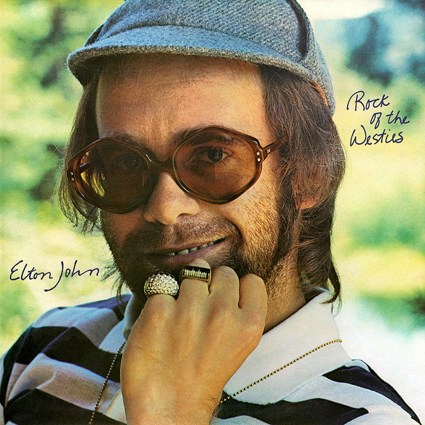
Part of what fueled misunderstanding of Elton John’s music by mainstream rock critics was Elton’s lack of stylistic consistency. On the Rock of The Westies album, the music covers many of the rock splinters that emerged in the 1970s. Departing from traditional rock norms that prize authenticity, virtuosity, and a consistent sound, Elton on Rock of the Westies is a mutable musical chameleon, able to exist as a singer-songwriter, country rocker, or arena rocker all at the same time. I will analyze musical elements of Elton John’s album, Rock of the Westies, to partially explain the troubles that rock critics had writing about his music.
The first song on the record, “Medley:Yell Help / Wednesday Night / Ugly,” is a medley of three songs. “Yell Help” features vocals at the forefront of the song, backed up by guitar, bass, synthesizer and drums, making it most like arena rock. The instrumentals are not virtuosic and repeat the same hook throughout the song. The lyrics are also not particularly varied. “Wednesday Night” is more ethereal and has a gospel-style set of backup singers and solely alternative instrumentation, making it a sort of blend of soul and psychedelic styles from earlier in the decade. “Ugly,” is more rough than the other two songs in the medley, Elton changes the timbre of his voice to make it more harsh and changes pronunciation of some words “U-ug-lay!” instead of “ugly” and “sang” instead of “sing.” This song also fits into arena rock, with electric guitar and a driving drum beat but with a very different sound than “Yell Help.”
Later on the record, Elton shifts to a singer-songwriter style on “I Feel Like a Bullet (In the Gun of Robert Ford).” This song is dominated by Elton’s singing and piano playing and backed up by a simple drum beat staying on the snare and hi-hat, and a simple bass line. It also tells a personal story from Elton, in the song he sees himself as a bullet in Robert Ford’s gun. Robert Ford was the member of Jesse James’s gang who killed James to collect a reward and receive immunity for his own crimes. Elton, or at least the character he portrays in the song, feels shame about doing something terrible for money. The focus of the song is on the lyrical story with the instruments sitting in the background, making it the epitome of singer-songwriter music.
Elton follows up “Bullet in the Gun” with “Street Kids,” which identifies itself as country rock in the opening seconds of the song. With extra-musical sounds that bring to mind a wild-west standoff, steel-string guitar, and a jaunty drum beat, Elton bridges into country rock. In the tradition of country rock, Elton tells a story of children from the wrong side of the tracks, showing the breadth of personas he is able to write from the perspective of.
“Hard Luck Story,” continues Elton’s shifting perspective, this time playing an arena-rock style song from the perspective of a worker stuck in a monotonous job and a life that they do not want. The speaker of the song is dissatisfied with his job, his marriage and his society, all of which have failed him. This song breaks from most arena rock by telling a story like this but remains in the genre with the presence of electric guitar, bass, drums, alternative instrumentation in its use of the bongos and a repeated refrain. The song is also the most virtuosic on the album, showing off skills on the guitar and piano at a fast tempo.
Elton John’s refusal to stay in his lane musically or lyrically accounts for part of what makes him difficult for rock critics to analyze or understand. Because he shifts musical styles and narrative perspectives, they cannot analyze him accurately, within the scope of his musical world. This leads to misunderstandings by rock critics and criticisms that are not substantive, such as Stephen Holden’s claim that the Rock of the Westies album is good live but does not hold up on record.